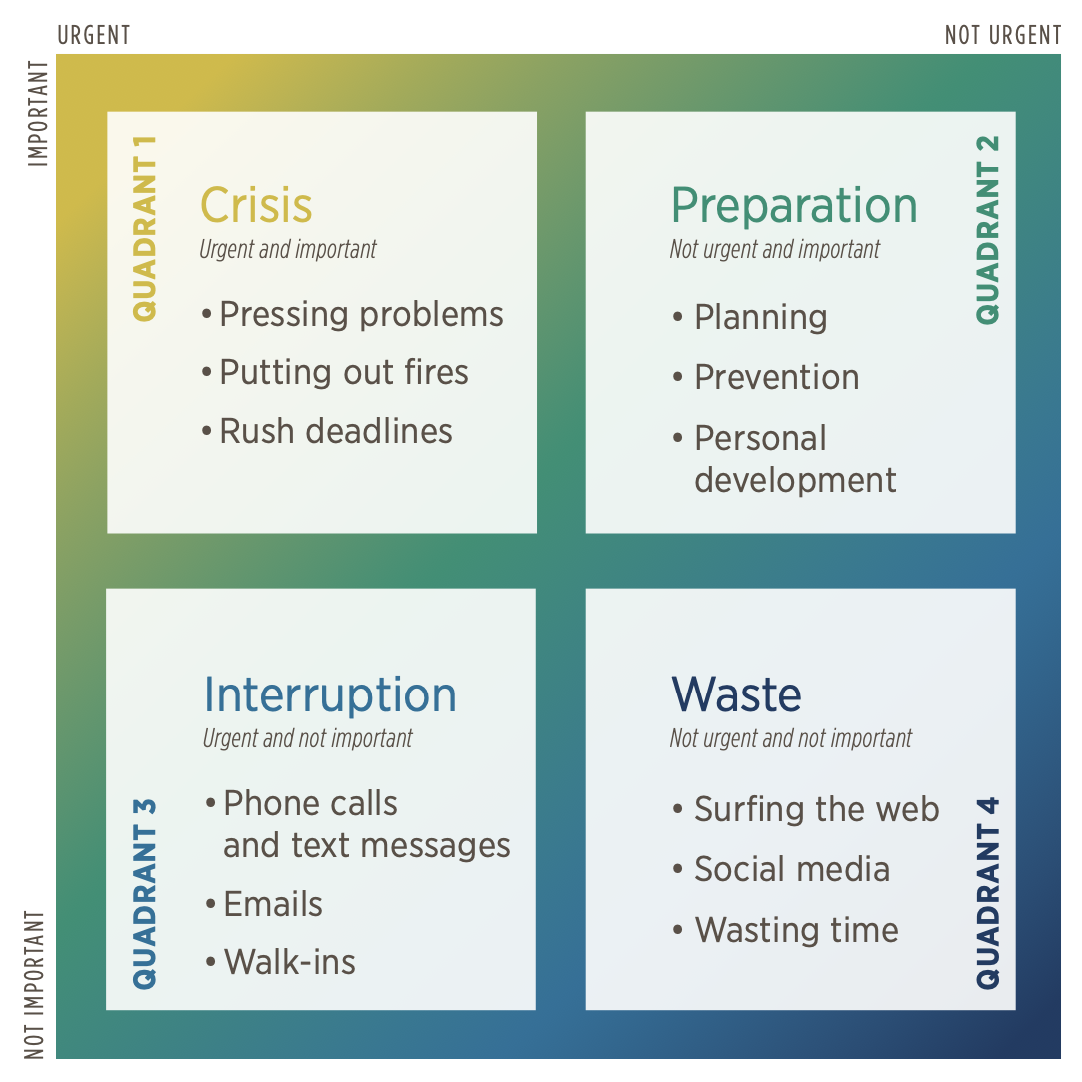Reading: Quadrants of Time Management
QUADRANTS OF TIME MANAGEMENT
Everything you do in life can be classified by it’s urgency (urgent or not urgent) and by it’s importance (important or not important). This creates the matrix illustrated below with four quadrants:

We often spend our lives focused on the urgent things instead of the important things. In business as in life it is extremely important to ask yourself: “Am I doing this because it is truly important or am I doing this because it is urgent?”
Important and urgent things should not be ignored: Crises and emergencies. However, the more time you can spend on the non-urgent but important things (prevention, planning, improvement) the less crises and emergencies you will experience.
Below is a more detailed explanation of each quadrant along with some examples:
QUADRANT 1: Crisis
Fire fighting mode: Crises, real hard deadlines for important projects, health and family emergencies, etc.
These are urgent and important things that you should not ignore. However, spending too much time in fire fighting mode will lead to stress and burnout. You will be caught in a never-ending cycle of crisis management.
The only way to reduce the time you spend in this quadrant is to be proactive (https://czarto.com/2013/08/03/reactive-vs-proactive- language/) and to spend more time on the important things BEFORE they become emergencies (see Quadrant 2 below).
EXAMPLE: Dealing with a heart attack is an urgent and important problem that cannot be ignored (but perhaps by living a healthier lifestyle such health emergencies can be reduced or avoided all together).
QUADRANT 2: Preparation
This is where you should spend most of your time.
Quadrant 2 is all about planning, prevention, capability improvement, relationship building, recognizing new opportunities, etc.
Spending time on these important things should lead to clear vision and a balanced life, discipline, control, and fewer and fewer crisis situations.
EXAMPLES:
Frequently buying flowers for your wife/girlfriend “just because.”
Eating healthy and exercising to avoid future health issues.
Preventative maintenance on your home or car.
Reading, learning, and education.
Forming bonds and strengthening relationships with your friends and family.
- Self renewal and spending time on things that inspire and uplift you.
QUADRANT 3: Interruption
Many of us spend a big portion of our time in this Quadrant confusing the urgent things for the important things.
Interruptions, ringing phones, most emails, etc... Spending too much time on the unimportant urgent things leads to a very short-term focus with continual crisis management. Your plans and goals will seem increasingly useless since you are unlikely to have time to devote to them. Your relationships and reputation will suffer and you will feel victimized with no control over your life.
EXAMPLE:
You have scheduled an important meeting with a coworker two weeks ahead of time. This person has very limited time and so you carve out a 30 minute window to deal with a very important matter. As you sit down and start the meeting, your phone rings.
The phone is screaming: “Pick me up! Pick me up! Pick me up!” Most people will answer the phone and sacrifice the very important meeting for the likely not important but urgent ringing phone.
QUADRANT 4: Waste
These are the time wasters in your life.
Spending too much time on non-urgent and not important things can lead to dependence on others for your basics, loss of jobs, irresponsibility, etc.
EXAMPLES:
Trivial busy work.
Mindless web surfing.
Watching too much TV.
Lots of pleasant activities.
